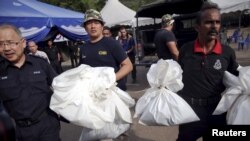Malaysia's national police chief announced Monday that 139 grave sites and 28 camps of suspected human traffickers had been found in the northern part of the country.
"They are not sure how many bodies are in each grave," General Khalid Abu Bakar told reporters in Wang Kelian, Malaysia. "The first team of our officers has arrives in the area this morning to exhume the bodies."
The largest of the camps, found between May 11 and 23 in hard-to-reach mountainous jungle areas, could have held up to 300 people, according to Malaysian officials.
The country's prime minister, Majib Razak, wrote on his Facebook page Sunday that he was "deeply concerned" by the graves' discovery and that "we will find those responsible."
The graves were discovered in Malaysia's northern state of Perlis, which borders Thailand's Songkhla province. There, a similar traffickers' camp and mass grave were found two weeks ago.
The border area has been a way station for smugglers funneling migrants and refugees from Bangladesh and Myanmar primarily to Malaysia. They use the camps along journeys that can include dangerous sea crossings. In recent weeks, smugglers have deserted thousands of people on the Bay of Bengal and the Andaman Sea.
The discovery of mass graves in Thailand, where at least 26 bodies have been exhumed, prompted a crackdown on the trafficking network by Bangkok's military-run government.
Authorities blamed
Malaysia and Thai authorities have faced accusations from rights groups that they had turned a blind eye to the problem and that there was evidence of complicity by corrupt officials.
"Clearly, this area has been an enclave for these ransom-for-release camps," Human Rights Watch's deputy Asia director, Philip Robertson, told VOA. "And I don't believe for a second that that could take place without connivance, at some level, by the authorities."
The Malaysian police chief pledged that no one, including Malaysian officials, will be overlooked in their investigation.
Thailand has taken into custody or issued arrest warrants for nearly 80 people in connection with the smuggling.
"In Thailand, what we've seen is local politicians and police being arrested. That's a first step," Robertson said. "But they're not getting to the real masterminds, the sort of senior patrons behind these movements. And I'm expecting that we may see the same on the Malaysian side, as well, that a few low-level scapegoats will be rounded up to take the blame for what was happening here."
Boats abandoned
Without a secure place to land, some smugglers this month abandoned their boats at sea, leaving people on rickety wooden ships to fend for themselves with little or no food and water.
Indonesia, Malaysia and Thailand had rebuffed the overcrowded vessels seeking refuge. Facing international criticism, Indonesia and Malaysia last week announced they would temporarily allow the boat people to land so they could be processed for repatriation or resettlement elsewhere.
The passengers are Rohingyas from Myanmar and Bangladeshis.
Several thousand have been rescued off Indonesia and Malaysia or have swum ashore this month. Rights group believes thousands more could still be at sea.
Myanmar, a predominantly Buddhist country, largely does not recognize the Rohingya, who are Muslims, as citizens. The Rohingya have faced intense discrimination in Myanmar; 140,000 have been displaced since mid-2012 by riots in Rakhine state.
Callous attitude
Impoverished Bangladeshis, risking their lives for better opportunities abroad, are also finding little sympathy from their government.
Prime Minister Shiekh Hasina remarked on Sunday, according to the state-run Sangbad Sangstha news agency, that the boat people are "mentally sick."
Hasina asserted there is sufficient work for them at home and their exodus is "tainting Bangladesh's image in the international arena."







